thirteen colonies
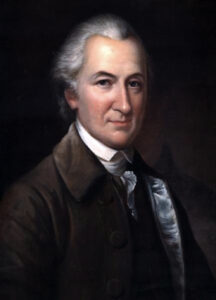
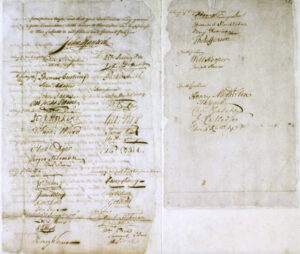 The American Revolutionary War actually began on April 19, 1775, with the Battles of Lexington and Concord. At that time, it wasn’t considered a full-blown war, and attempts were still being made by July 5, 1775, to avoid that full-blown war. The Olive Branch Petition, adopted by the Second Continental Congress on July 5, 1775, and signed on July 8th, was the final attempt to avoid the full-blown war between Great Britain and the Thirteen Colonies in America, that became known as the American Revolutionary War, and ended with full independence of the United States.
The American Revolutionary War actually began on April 19, 1775, with the Battles of Lexington and Concord. At that time, it wasn’t considered a full-blown war, and attempts were still being made by July 5, 1775, to avoid that full-blown war. The Olive Branch Petition, adopted by the Second Continental Congress on July 5, 1775, and signed on July 8th, was the final attempt to avoid the full-blown war between Great Britain and the Thirteen Colonies in America, that became known as the American Revolutionary War, and ended with full independence of the United States.
It seemed that in the early days of the Revolutionary War, the main weapon was a volley of petitions and proclamations. The Second Continental Congress had already authorized the invasion of Canada more than a week earlier, but the Olive Branch Petition affirmed American loyalty to Great Britain, asking King George III to prevent further conflict. The petition was followed up with a July 6th Declaration of the Causes and Necessity of Taking Up Arms, making the success of the Olive Branch Petition unlikely in London. By August 1775, London officially declared the colonies to be in rebellion by the Proclamation of Rebellion, and the Olive Branch Petition was rejected by the British government. In fact, King George had refused to read it before declaring that the colonists were traitors.
The Second Continental Congress convened in May 1775. At that time, most and most delegates followed John Dickinson in his quest to reconcile with King George. He could not picture a world with an independent United States. I suppose there are always those people without a vision for the future. However, there was a small group of delegates, led by John Adams, who could see that war was inevitable, and that we would need to become independent of Great Britain. Nevertheless, there is a right time, so they decided that the wisest course of action was to remain quiet and wait for the opportune time to rally the people. This allowed Dickinson and his followers to pursue their own course for a reconciliation that would ultimately never happen.
Dickinson was the primary author of the Olive Branch Petition, along with Benjamin Franklin, John Jay, John Rutledge, and Thomas Johnson, all of whom also served on the drafting committee. Dickinson claimed that the colonies did not want independence, but rather, wanted more equitable trade and tax regulations. He asked that the King establish a lasting settlement between the Mother Country and the colonies “upon so firm a basis as to perpetuate its blessings, uninterrupted by any future dissensions, to succeeding generations in both countries” beginning with the repeal of the Intolerable Acts. The introductory paragraph of the letter named twelve of the thirteen colonies, all except Georgia. The letter was approved on July 5 and signed by John Hancock, President of the Second Congress, and by representatives of the named twelve colonies. It was sent to London on July 8, 1775, in the care of Richard Penn and Arthur Lee. Dickinson hoped that news of the Battles of Lexington and Concord combined with the “humble petition” would persuade the King to respond with a counterproposal or open negotiations.
Finally, Adams wrote to a friend, telling him that the petition served no purpose. Everyone knew that war was inevitable. Adams said that the colonies should have already raised a navy and taken the British officials prisoner. Unfortunately, the letter was intercepted by British officials and news of its contents reached Great Britain at about the same time as the petition itself. British advocates of a military response used Adams’ letter to claim that the petition itself was insincere, and it was rejected. The hostilities which Adams had foreseen undercut the petition, and the King had answered it before it even reached him.
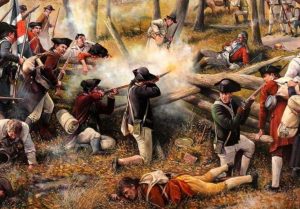
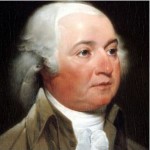
With the King’s refusal to consider the petition, came the opportunity Adams and others needed to push for independence. Now the colonists viewed the King as unwilling and uninterested concerning the colonists’ grievances. The colonists finally knew that they had just two choices…complete independence or complete submission to British rule. They chose complete independence, and the rest, as we all know, is history.
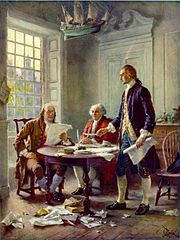
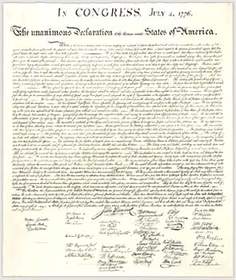 While Independence Day is celebrated on July 4th each year, with all the festivities, days off, barbecues, and fireworks, our nation…formally known as the thirteen colonies, actually obtained legal separation from Great Britain on July 2, 1776, when the Second Continental Congress voted to approve a resolution of independence that had been proposed in June by Richard Henry Lee of Virginia declaring the United States independent from Great Britain’s rule. Called the Lee Resolution, it was also known as “The Resolution for Independence” and was the formal assertion passed by the Second Continental Congress on July 2nd. The Lee Resolution resolved that the Thirteen Colonies, at the time referred to as the United Colonies, were “free and independent states” and were now separate from the British Empire. The resolution created what became the United States of America.
While Independence Day is celebrated on July 4th each year, with all the festivities, days off, barbecues, and fireworks, our nation…formally known as the thirteen colonies, actually obtained legal separation from Great Britain on July 2, 1776, when the Second Continental Congress voted to approve a resolution of independence that had been proposed in June by Richard Henry Lee of Virginia declaring the United States independent from Great Britain’s rule. Called the Lee Resolution, it was also known as “The Resolution for Independence” and was the formal assertion passed by the Second Continental Congress on July 2nd. The Lee Resolution resolved that the Thirteen Colonies, at the time referred to as the United Colonies, were “free and independent states” and were now separate from the British Empire. The resolution created what became the United States of America.
After passing the vote for independence, Congress could turn its attention to the Declaration of Independence, which would be the official statement explaining this decision. The Declaration of Independence had been prepared by a Committee of Five, with Thomas Jefferson as its principal author. While Jefferson collaborated extensively with the other four members of the Committee of Five, i,t was largely his writing and his wording that made up the Declaration of Independence. It was composed in isolation over 17 days between June 11, 1776, and June 28, 1776. Jefferson was renting the second floor of a three-story private home at 700 Market Street in Philadelphia at the time. The house, within walking distance of Independence Hall, is now known as the Declaration House.
Of course, as with any document brought before Congress, they debated and revised the wording of the Declaration, and for reasons unknown, removed wording in which Jefferson had vigorously denounced King George III for importing the slave trade. They finally approved the document two days later on July 4th. John 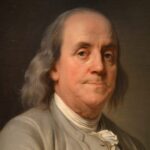

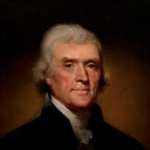 Adams wrote a letter to his wife, Abigail, on July 3rd, stating, “The second day of July 1776, will be the most memorable epoch in the history of America. I am apt to believe that it will be celebrated by succeeding generations as the great anniversary festival. It ought to be commemorated as the day of deliverance, by solemn acts of devotion to God Almighty. It ought to be solemnized with pomp and parade, with shows, games, sports, guns, bells, bonfires, and illuminations, from one end of this continent to the other, from this time forward forever more.”
Adams wrote a letter to his wife, Abigail, on July 3rd, stating, “The second day of July 1776, will be the most memorable epoch in the history of America. I am apt to believe that it will be celebrated by succeeding generations as the great anniversary festival. It ought to be commemorated as the day of deliverance, by solemn acts of devotion to God Almighty. It ought to be solemnized with pomp and parade, with shows, games, sports, guns, bells, bonfires, and illuminations, from one end of this continent to the other, from this time forward forever more.”
Of course, as we all know, Adams’s prediction was off by two days. Nevertheless, his idea that a day should be celebrated forever, did become a tradition, not on July 2nd, but rather on July 4th, because of the Declaration of Independence. That was because of the date shown on the much-publicized Declaration of Independence, rather than the date the resolution of independence was approved in a closed session of Congress. In addition, historians have disputed whether members of Congress signed the Declaration of Independence on July 4th, even though Thomas Jefferson, John Adams, and Benjamin Franklin all later wrote that they had signed it on that day. Many historians believe that the Declaration was signed nearly a month after its adoption, on August 2, 1776, and not on July 4th as many have believed. Nevertheless, they have been unable to prove their theory or to change the date on which we celebrate our independence.
One thing that I find very interesting is the fact that both Thomas Jefferson and John Adams, who were the only two signatories of the Declaration of Independence later to serve as presidents of the United States, both 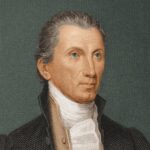
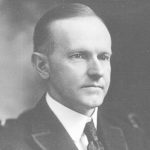 died on the same day…July 4, 1826, and within five hours of each other. They were also the last surviving members of the original American revolutionaries. It was also the 50th anniversary of the Declaration of Independence. James Monroe, while not a signatory of the Declaration of Independence, but who was another Founding Father who was elected president, also died on July 4, 1831, making him the third President who died on the anniversary of independence. There was one president who was born on Independence Day…Calvin Coolidge, who was born on July 4, 1872.
died on the same day…July 4, 1826, and within five hours of each other. They were also the last surviving members of the original American revolutionaries. It was also the 50th anniversary of the Declaration of Independence. James Monroe, while not a signatory of the Declaration of Independence, but who was another Founding Father who was elected president, also died on July 4, 1831, making him the third President who died on the anniversary of independence. There was one president who was born on Independence Day…Calvin Coolidge, who was born on July 4, 1872.
 When the British Colonies, also known as the Thirteen Colonies or the early United States, were founded in the 1600s, the colonies were left to govern themselves for the most part. The land was really an expansion of power for Britain. Nevertheless, there were wars that took place in the new land and with them the costs of war, and because the colonies were owned by the British government, the cost of war fell on them. The cost of victory in the 1754 to 1763 French and Indian War and the 1756 to 1763 Seven Years’ War left the British government deeply in debt. The wars were fought in the colonies, but were equipped and populated with the British forces stationed there, at the cost of millions of British funds. The British government decided to impose The Stamp Act and Townshend Acts to pay for the wars, which provoked colonial opposition and unrest, leading to the 1770 Boston Massacre and 1773 Boston Tea Party. Then, came the Intolerable Acts, meant to punish the Massachusetts colonists for their defiance in the Tea Party protest in reaction to changes in taxation by the British Government, in spring 1774 upon Massachusetts. It was enough. These acts took away self-governance and rights that Massachusetts had enjoyed since its founding, and triggered outrage and indignation in the Thirteen Colonies, and twelve colonies sent delegates to the First Continental Congress, from September 5, 1774 to October 26, 1774. Their goal was to draft a petition to the King and organize a boycott of British goods. It was these acts…the acts that took away self-governance and other rights that triggered outrage and indignation in the Thirteen Colonies. We have often heard it called “taxation without representation” and it would never be tolerated. This nation had tasted freedom, and would never go back. These acts were key developments in the outbreak of the American Revolutionary War in April 1775.
When the British Colonies, also known as the Thirteen Colonies or the early United States, were founded in the 1600s, the colonies were left to govern themselves for the most part. The land was really an expansion of power for Britain. Nevertheless, there were wars that took place in the new land and with them the costs of war, and because the colonies were owned by the British government, the cost of war fell on them. The cost of victory in the 1754 to 1763 French and Indian War and the 1756 to 1763 Seven Years’ War left the British government deeply in debt. The wars were fought in the colonies, but were equipped and populated with the British forces stationed there, at the cost of millions of British funds. The British government decided to impose The Stamp Act and Townshend Acts to pay for the wars, which provoked colonial opposition and unrest, leading to the 1770 Boston Massacre and 1773 Boston Tea Party. Then, came the Intolerable Acts, meant to punish the Massachusetts colonists for their defiance in the Tea Party protest in reaction to changes in taxation by the British Government, in spring 1774 upon Massachusetts. It was enough. These acts took away self-governance and rights that Massachusetts had enjoyed since its founding, and triggered outrage and indignation in the Thirteen Colonies, and twelve colonies sent delegates to the First Continental Congress, from September 5, 1774 to October 26, 1774. Their goal was to draft a petition to the King and organize a boycott of British goods. It was these acts…the acts that took away self-governance and other rights that triggered outrage and indignation in the Thirteen Colonies. We have often heard it called “taxation without representation” and it would never be tolerated. This nation had tasted freedom, and would never go back. These acts were key developments in the outbreak of the American Revolutionary War in April 1775.
The Revolutionary War was not going to be a short war. It would rage from April 19, 1775 to September 3, 1783…eight long years. For seven years after the United States Declaration of Independence was adopted by the Second Continental Congress at its meeting in Philadelphia, Pennsylvania, on July 4, 1776, the war still raged on. I don’t suppose any nation would want to simply lay down its control, but the reality is that Britain had lost its control many years before, and it was time to cut their losses and go home.
It was on June 11, 1776, that the Continental Congress made the decision and selected Thomas Jefferson of Virginia, John Adams of Massachusetts, Benjamin Franklin of Pennsylvania, Roger Sherman of Connecticut and Robert R. Livingston of New York to draft our Declaration of Independence. That moment truly sealed the fate of the Britain ownership of this nation. The words they penned would be taught in schools, put on documents, t-shirts, decals, and many other forms of media. Because John Adams knew of Thomas Jefferson’s prowess with a pen, he urged him to author the first draft of the document, which was then carefully revised by Adams and Franklin before being given to Congress for review on June 28. I don’t know how many have ever read the entire Declaration of Independence, but I have chosen to place it in its unedited entirety, because I think we need to know why our founding fathers fought so hard for our independence. The 4th of July is not about picnics and fireworks, it is about freedom, and we must never forget that…nor the five men who wrote it and the entire congress who signed it.
The Declaration of Independence
“When in the Course of human events, it becomes necessary for one people to dissolve the political bands which have connected them with another, and to assume among the powers of the earth, the separate and equal station to which the Laws of Nature and of Nature’s God entitle them, a decent respect to the opinions of mankind requires that they should declare the causes which impel them to the separation.
We hold these truths to be self-evident, that all men are created equal, that they are endowed by their Creator with certain unalienable Rights, that among these are Life, Liberty and the pursuit of Happiness.–That to secure these rights, Governments are instituted among Men, deriving their just powers from the consent of the governed, –That whenever any Form of Government becomes destructive of these ends, it is the Right of the People to alter or to abolish it, and to institute new Government, laying its foundation on such principles and organizing its powers in such form, as to them shall seem most likely to effect their Safety and Happiness. Prudence, indeed, will dictate that Governments long established should not be changed for light and transient causes; and accordingly all experience hath shewn, that mankind are more disposed to suffer, while evils are sufferable, than to right themselves by abolishing the forms to which they are accustomed. But when a long train of abuses and usurpations, pursuing invariably the same Object evinces a design to reduce them under absolute Despotism, it is their right, it is their duty, to throw off such Government, and to provide new Guards for their future security.–Such has been the patient sufferance of these Colonies; and such is now the necessity which constrains them to alter their former Systems of Government. The history of the present King of Great Britain is a history of repeated injuries and usurpations, all having in direct object the establishment of an absolute Tyranny over these States. To prove this, let Facts be submitted to a candid world.
He has refused his Assent to Laws, the most wholesome and necessary for the public good.
He has forbidden his Governors to pass Laws of immediate and pressing importance, unless suspended in their operation till his Assent should be obtained; and when so suspended, he has utterly neglected to attend to them.
He has refused to pass other Laws for the accommodation of large districts of people, unless those people would relinquish the right of Representation in the Legislature, a right inestimable to them and formidable to tyrants only.
He has called together legislative bodies at places unusual, uncomfortable, and distant from the depository of their public Records, for the sole purpose of fatiguing them into compliance with his measures.
He has dissolved Representative Houses repeatedly, for opposing with manly firmness his invasions on the rights of the people.
He has refused for a long time, after such dissolutions, to cause others to be elected; whereby the Legislative powers, incapable of Annihilation, have returned to the People at large for their exercise; the State remaining in the mean time exposed to all the dangers of invasion from without, and convulsions within.

He has endeavoured to prevent the population of these States; for that purpose obstructing the Laws for Naturalization of Foreigners; refusing to pass others to encourage their migrations hither, and raising the conditions of new Appropriations of Lands.
He has obstructed the Administration of Justice, by refusing his Assent to Laws for establishing Judiciary powers.
He has made Judges dependent on his Will alone, for the tenure of their offices, and the amount and payment of their salaries.
He has erected a multitude of New Offices, and sent hither swarms of Officers to harrass our people, and eat out their substance.
He has kept among us, in times of peace, Standing Armies without the Consent of our legislatures.
He has affected to render the Military independent of and superior to the Civil power.
He has combined with others to subject us to a jurisdiction foreign to our constitution, and unacknowledged by our laws; giving his Assent to their Acts of pretended Legislation:
For Quartering large bodies of armed troops among us:
For protecting them, by a mock Trial, from punishment for any Murders which they should commit on the Inhabitants of these States:
For cutting off our Trade with all parts of the world:
For imposing Taxes on us without our Consent:
For depriving us in many cases, of the benefits of Trial by Jury:
For transporting us beyond Seas to be tried for pretended offences
For abolishing the free System of English Laws in a neighbouring Province, establishing therein an Arbitrary government, and enlarging its Boundaries so as to render it at once an example and fit instrument for introducing the same absolute rule into these Colonies:
For taking away our Charters, abolishing our most valuable Laws, and altering fundamentally the Forms of our Governments:
For suspending our own Legislatures, and declaring themselves invested with power to legislate for us in all cases whatsoever.
He has abdicated Government here, by declaring us out of his Protection and waging War against us.
He has plundered our seas, ravaged our Coasts, burnt our towns, and destroyed the lives of our people.
He is at this time transporting large Armies of foreign Mercenaries to compleat the works of death, desolation and tyranny, already begun with circumstances of Cruelty & perfidy scarcely paralleled in the most barbarous ages, and totally unworthy the Head of a civilized nation.
He has constrained our fellow Citizens taken Captive on the high Seas to bear Arms against their Country, to become the executioners of their friends and Brethren, or to fall themselves by their Hands.
He has excited domestic insurrections amongst us, and has endeavoured to bring on the inhabitants of our frontiers, the merciless Indian Savages, whose known rule of warfare, is an undistinguished destruction of all ages, sexes and conditions.
In every stage of these Oppressions We have Petitioned for Redress in the most humble terms: Our repeated Petitions have been answered only by repeated injury. A Prince whose character is thus marked by every act which may define a Tyrant, is unfit to be the ruler of a free people.
Nor have We been wanting in attentions to our Brittish brethren. We have warned them from time to time of attempts by their legislature to extend an unwarrantable jurisdiction over us. We have reminded them of the circumstances of our emigration and settlement here. We have appealed to their native justice and magnanimity, and we have conjured them by the ties of our common kindred to disavow these usurpations, which, would inevitably interrupt our connections and correspondence. They too have been deaf to the voice of justice and of consanguinity. We must, therefore, acquiesce in the necessity, which denounces our Separation, and hold them, as we hold the rest of mankind, Enemies in War, in Peace Friends.
We, therefore, the Representatives of the united States of America, in General Congress, Assembled, appealing to the Supreme Judge of the world for the rectitude of our intentions, do, in the Name, and by Authority of the good People of these Colonies, solemnly publish and declare, That these United Colonies are, and of Right  ought to be Free and Independent States; that they are Absolved from all Allegiance to the British Crown, and that all political connection between them and the State of Great Britain, is and ought to be totally dissolved; and that as Free and Independent States, they have full Power to levy War, conclude Peace, contract Alliances, establish Commerce, and to do all other Acts and Things which Independent States may of right do. And for the support of this Declaration, with a firm reliance on the protection of divine Providence, we mutually pledge to each other our Lives, our Fortunes and our sacred Honor.”
ought to be Free and Independent States; that they are Absolved from all Allegiance to the British Crown, and that all political connection between them and the State of Great Britain, is and ought to be totally dissolved; and that as Free and Independent States, they have full Power to levy War, conclude Peace, contract Alliances, establish Commerce, and to do all other Acts and Things which Independent States may of right do. And for the support of this Declaration, with a firm reliance on the protection of divine Providence, we mutually pledge to each other our Lives, our Fortunes and our sacred Honor.”

